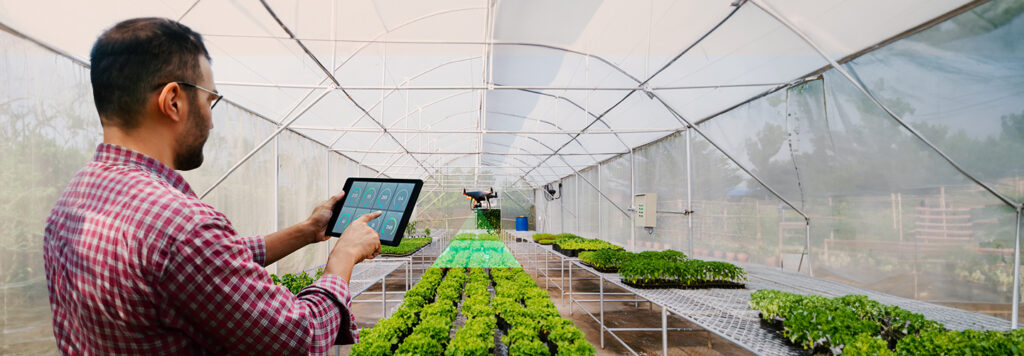From Seeds to Sales: Revolutionizing Plant Nursery Operations with Software

As agriculture revolutionizes amidst the growing population and consequent food demand, plant nurseries continue to play a pivotal role in providing high-quality planting materials, fostering genetic diversity, and supporting agricultural and horticultural endeavors. It is a specialized facility where various plants, from ornamentals to crops, are propagated, nurtured, and grown before being transplanted into their intended environments.
Over the years, plant nurseries have evolved from small-scale, traditional operations focused on producing basic plants for local gardens to more specialized and technologically advanced enterprises. Early nurseries aimed at meeting local demand for ornamental and agricultural plants. However, with urbanization and increasing investment in innovative agricultural practices, nurseries expanded to offer a wider variety of plant species and cultivars.
Confronting Major Challenges in Agriculture with Plant Nursery
Plant nurseries play a critical role in addressing various challenges in agriculture by providing solutions that contribute to improved productivity and resilience. As climate change intensifies and arable land declines across the globe, agricultural companies continue to seek answers to What do farmers use to make plants grow faster? Is a plant nursery a good investment?
Plant nursery serves as a primary source of high-quality planting materials for farmers, researchers, and agricultural companies. Its contribution to tackling current agricultural challenges includes:
- Crop Diversity and Adaptation
Nurseries cultivate a wide range of plant varieties, including those that are adapted to specific climates, soils, and growing conditions. This diversity helps farmers choose suitable plants that can thrive in their local environments, mitigating the risks associated with climate change and other environmental factors.
- Pest and Disease Management
Nurseries employ practices to produce disease-free and pest-resistant plants. By starting with healthy planting materials, farmers can reduce the likelihood of pest and disease outbreaks, minimizing the need for chemical treatments and promoting sustainable pest management.
- Quality and Yield Enhancement
High-quality seedlings from nurseries lead to healthier and more vigorous plants in the field. This translates to improved crop yields, better quality produce, and increased profitability for farmers.
- Biodiversity Conservation
Nurseries may propagate and promote the use of native and endangered plant species. This supports biodiversity conservation efforts and contributes to the restoration of natural ecosystems.
- Soil Health
Nurseries often focus on producing plants with well-developed root systems. Healthy roots contribute to improved soil structure, water retention, and nutrient cycling when transplanted, enhancing overall soil health.
Common Practices of Plant Nursery Operations and Management
Plant nursery operations encompass practices like seed selection, propagation, and disease management, aiming for healthy plants. Additionally, controlled climate, training, and inventory management ensure quality.
Management, on the other hand, involves strategic planning, staff training, and sustainability practices, ensuring efficient operations. This blend of horticultural expertise and business acumen leads to robust plant production, profitability, and industry leadership.
Counting on Technologies
The past plant nurseries saw a transition from basic local operations to diversified businesses, and it now holds a high potential for technological integration, adaptation to changing urban landscapes and addressing global challenges. Moreover, new technologies have significantly transformed the plant nursery industry, enhancing efficiency, precision, and sustainability across various aspects of operations and management.
Automation in Streamlining Plant Nursery Operations
Automation technologies, such as robotics and conveyor systems, revolutionize plant nursery operations by handling tasks like potting, transplanting, and sorting. These systems enhance efficiency, reduce labor costs, and ensure uniformity in plant care, ultimately improving productivity and freeing up human resources for more specialized tasks.
Leveraging Smart Climate Control for Nursery Success
Smart climate control systems integrate sensors, environmental data, and automation to regulate temperature, humidity, and light levels within nurseries. By creating optimal growth conditions, these technologies facilitate year-round production, accelerate growth rates, and enhance the overall health and quality of plants.
Precision Irrigation’s Contribution to Nursery Sustainability
Precision irrigation systems utilize real-time data from sensors to provide plants with the exact amount of water they need. This approach minimizes water wastage, prevents overwatering and underwatering, and promotes healthy root development. As a result, plants receive optimal hydration, leading to improved growth and resource efficiency.
Harnessing Data Analytics for Nursery Performance Enhancement
Harnessing data analytics tools allows nurseries to monitor and analyze growth patterns, environmental factors, and historical performance. By identifying trends and correlations, nurseries can make informed decisions about plant care strategies, resource allocation, and inventory management, leading to more effective and efficient operations.
Pioneering Pathways with GIS and Mapping
Geographic Information Systems (GIS) and mapping technologies aid nursery planning and layout design. These tools help optimize space usage, streamline workflows, and ensure efficient movement of materials and personnel. GIS also assists in visualizing geographical data, identifying potential challenges, and making informed decisions for nursery expansion and design.
Elevating Plant Nursery Management with Precision Agriculture Tools
Precision agriculture tools like drones and satellite imagery offer a bird’s-eye view of large nursery spaces. They provide valuable insights into plant health, growth patterns, and potential issues such as disease outbreaks or nutrient deficiencies. This real-time monitoring enhances early detection, facilitates targeted interventions, and contributes to more proactive and effective plant management strategies.
Unlocking the Role of Plant Nursery Management Software
Plant nursery management software like FarmERP has revolutionized plant nursery operations and management, acting as a digital backbone that orchestrates and optimizes various facets of the nursery workflow. This technology-driven solution empowers nurseries by centralizing critical data, automating tasks, and facilitating informed decision-making.
From inventory tracking and crop planning to climate control integration and pest management, the software streamlines operations, enhances resource efficiency, and ensures timely responses to challenges. This results in increased productivity, improved quality control, and sustainable practices, all organized through the seamless integration of farm management software into their daily operations.
- Inventory Tracking
Plant nursery management software plays a pivotal role in meticulous inventory supervision. By tracking plant inventory, growth stages, and quantities, this technology ensures an optimized stock management process. The software also closely monitors overstocking or shortages, maintaining an optimal balance of plants for various seasons. It becomes a key to meeting the ever-changing demands of customers and market trends.
- Crop Planning
Plant nursery management software aids in every step of the process in a plant nursery, from crop selection to precise planning and scheduling. By aligning production with prevailing market trends and discerning customer preferences, the software becomes a compass for the nursery’s success. Furthermore, it optimizes spatial usage and rotational strategies, ensuring the efficient allocation of resources while reaping high yields.
- Data Centralization
Plant nursery management software gathers an array of important data, encompassing everything from plant growth details to the intricacies of sales transactions. With this wealth of information in a single platform, the software streamlines decision-making processes. Nursery managers gain access to detailed insights, facilitating well-informed choices for the nursery’s success.
- Accounting and Financial Tracking
The software streamlines budgeting, expense tracking, and pricing decisions to enhance accounting and financial management. Its analytical capabilities provide insights into revenue streams and expenditure patterns, fostering better profitability management. It becomes a strategic tool for prudent financial planning and informed decision-making in nursery operations.
Plant Nursery Operations: The Road Ahead
Today, plant nurseries lie in their pivotal role within sustainability and urban agriculture paradigms. Nurseries are poised to promote sustainable practices by propagating native, drought-resistant, and climate-adaptive plant varieties.
As urbanization intensifies, nurseries will also support urban agriculture by supplying space-efficient plants for vertical gardens, rooftop farms, and green infrastructure. They will contribute to reducing urban heat islands, improving air quality, and enhancing urban aesthetics. Moreover, the integration of advanced technologies in plant nurseries and innovative cultivation methods will drive resource-efficient production, fostering resilience in both local food ecosystems and urban landscapes.
